My Car Was Making a Funny Noise Like a
1 / 9

Your car makes a humming noise when accelerating
While driving, you hear a low-pitched hum. As you accelerate, the noise gets louder—maybe it sounds like an airplane taking off—but after a certain speed the volume is consistent. When you make a turn, the noise gets louder; but if you turn the other way, it disappears.
What it could mean: This is most likely a wheel bearing noise. It's often mistaken as an engine noise and one way you can tell is to watch your RPM gauge. As you accelerate, the RPM and speed gauges rise. Coast at a set speed, let off the gas pedal and watch the RPM gauge drop. If the noise is still there, it's definitely not coming from the engine.
2 / 9

Your car makes a droning noise
This droning noise doesn't change pitch or volume while turning, but it's louder as you accelerate.
What it could mean: This noise may be coming from your tires—particularly if they're old or of poor quality. It could also be a sign that you have "feathered" tires—a term used to describe tires with treads that are wearing unevenly. In turn, feathered tires could be a symptom of a worn suspension component, causing tires to hop up and down as you drive rather than rolling smoothly down the road.
Don't miss this expert advice on how to make your car tires last.
3 / 9

You car makes high-pitched squealing noise
Do you hear a high-pitched squeal, or perhaps even what sounds like a bird chirping when you first start the engine?
What it could mean: Your car's serpentine belt is likely worn or cracked. Some vehicles have multiple belts including a separate one for your air conditioning. If you hear this noise only when you turn on the air conditioning, you'll know there's an issue with that belt. It's also possible that the belt doesn't have enough tension (either the tension needs to be adjusted or the belt tensioner is worn). If there's not enough tension, the belt is slipping. Ever hear tires squeal on asphalt when someone does a burnout? It's the same idea.
Find out exactly what to do when your car won't start.
4 / 9
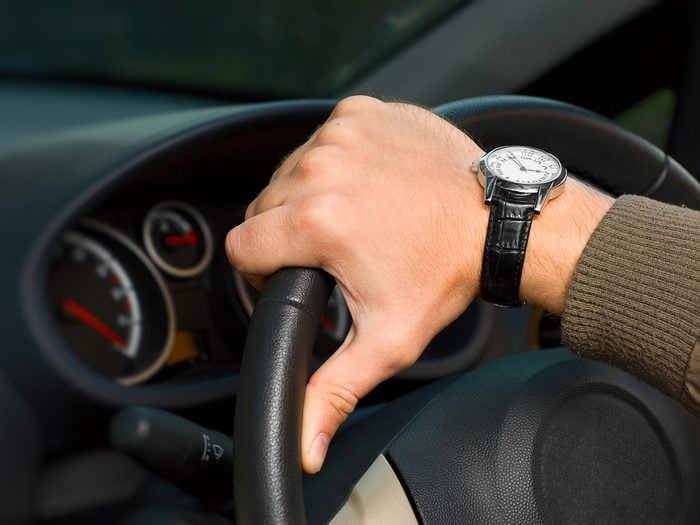
Your car whines while you're making a turn
What it could mean: You'll hear a high-pitched whine if your vehicle has hydraulic power steering and you "lock" the steering wheel by turning it to the point at which it doesn't turn anymore. This strains the power steering pump, and if you hold this position for more than a few seconds, you risk damaging the pump. Back off about an inch from the lock position to ease the increase in pump pressure, and the noise should disappear. If you hear a constant whine, your pump is probably already damaged.
Find out what it could mean if your steering wheel shakes.
5 / 9
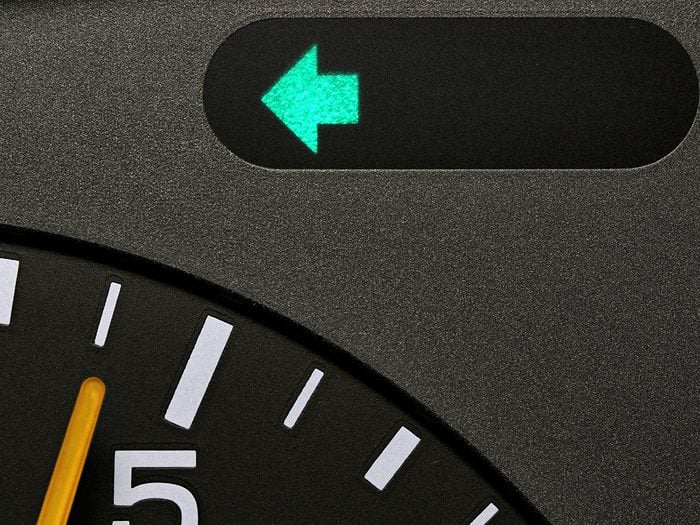
Your car makes a clicking noise while turning
When you turn one way, you hear a clicking noise. It's cyclical, so the noise speeds up as your wheels go faster or slows down if you're reducing your speed during the turn. The noise isn't necessarily there when you turn the other way.
What it could mean: This noise is likely coming from your CV axle. This happens when the CV axle shaft boot is torn and leaks grease. Without grease, the components become dry and start making a clicking sound. If there's no damage, your technician could replenish the grease and replace the boot. Otherwise, the CV axle should be replaced.
On the other hand, here are 10 car repairs you've probably wasted money on.
6 / 9
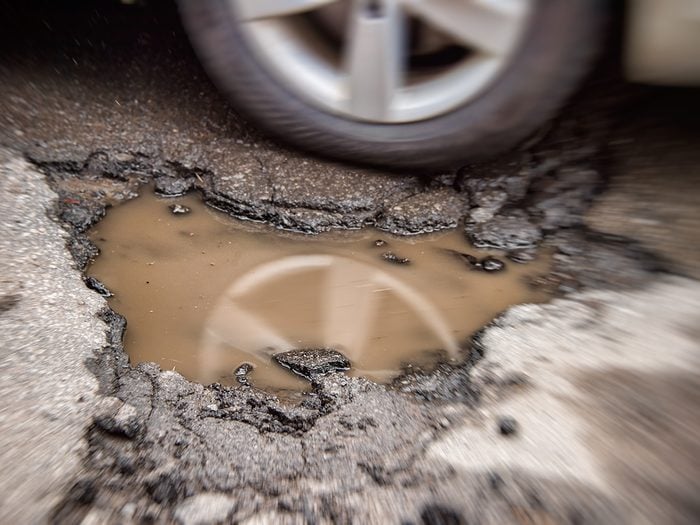
Your car makes low-pitched clunks and rattles
You may hear low-pitched clunks or rattles as you drive, especially over bumps.
What it could mean: These noises aren't usually cyclical, so you can rule out the wheel and tire system. There are numerous components in your suspension system including ball joints, stabilizer links, and coil springs. One thing's for sure, if you have a suspension noise that suddenly disappears there's a good chance the component is broken and disconnected from the rest of your car.
Find out 15 things you should never do to your car.
7 / 9
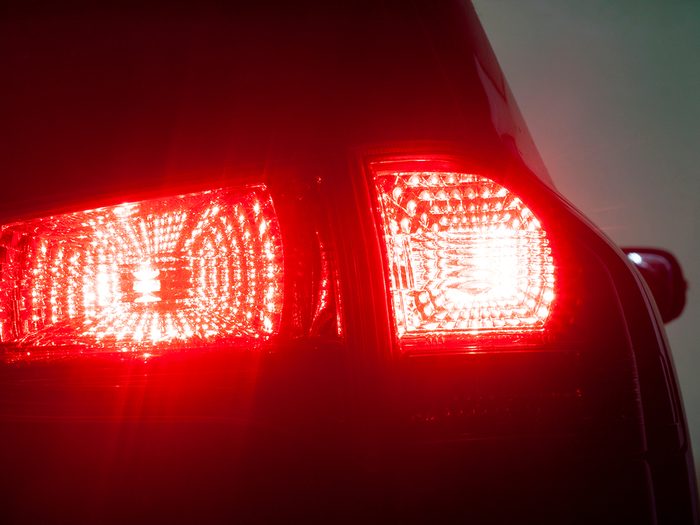
Your car makes light grinding or squeaking noises
What it could mean: A light grinding or squeaking whenever you brake is almost always because of poor or worn braking materials. If caught early enough, your technician will be able to service your brakes—a process that might involve cleaning, lubricating and adjusting the materials. Some brake pads have "squealers"—a piece of metal that rubs against the brake rotor once the pad material gets low. If you hear this cyclical noise even while driving, your brakes may need replacing. (Find out how often you should change your brake pads.)
Here's what to do if your car shakes when braking.
8 / 9
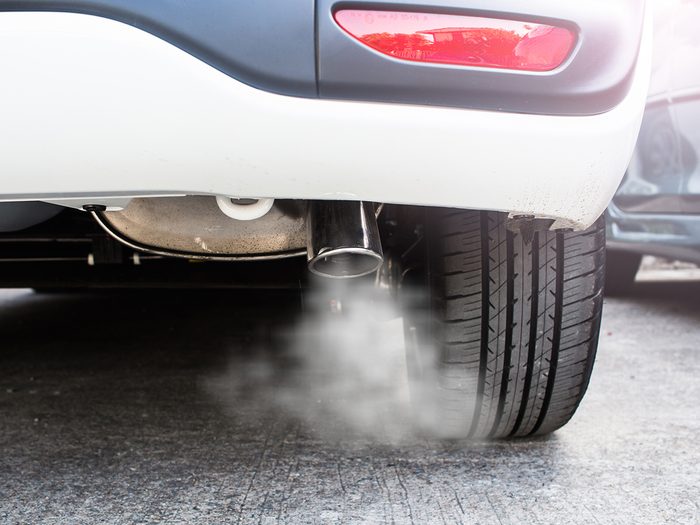
Your car makes a rumbling noise
At idle, you hear a rumbling noise. As you accelerate, the noise gets louder and pretty soon you can't even hear the radio or your passenger talking.
What it could mean: The exhaust system in your vehicle is made up of multiple pieces attached together, as opposed to one long pipe. You may have an exhaust leak at a gasket or in one of the exhaust component, such as the flexpipe, resonator or muffler. Depending on where it's leaking, the exhaust may be repaired. If that's not feasible, you'll need to replace the leaking component.
Here are the 20 essential tools no home mechanic should be without.
9 / 9

Your car sounds like an unbalanced washing machine
While driving, you hear a wobbling noise—like an unbalanced washing machine on the high spin cycle.
What it could mean: If you hear this sound, pull over right away, and check your wheels and tires. You may have loosened wheel nuts, which could result in the wheel falling off, or low tire pressure, which puts you at risk for a tire blowout. If your wheel nuts are loose, jack up your car slightly to take some of the weight off and use the lug wrench to tighten the wheel nuts. If the tire pressure is low, either fill it to the proper specification or swap it out with the spare tire.
Now that you know what these car noises mean, find out the best time to buy a new car.
Originally Published: February 02, 2022

schipperslout1983.blogspot.com
Source: https://www.readersdigest.ca/cars/maintenance/strange-car-sounds/
0 Response to "My Car Was Making a Funny Noise Like a"
Post a Comment